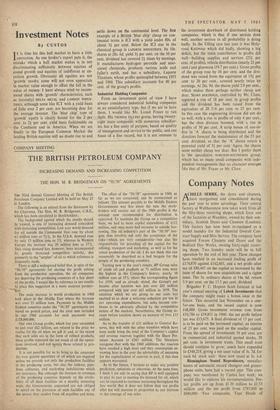Investment Notes
By CUSTOS
(correction. is time for this bull market to have a little 1 correction. As one broker's report puts it, the mistake which a bull market makes is in not discriminating sufficiently between equities of sound growth and equities of indifferent or un- certain growth. Obviously all equities are not 'growth' stocks; some will not even appreciate in market value enough to offset the fall in the value of money. I have always tried to recom- mend shares with 'growth' characteristics, such as (recently) DELTA METAL and LAMSON INDUS- TRIES, although some like ICT with a yield basis of little over 2 per cent. are becoming dear for the average investor. The 'blue chip' type of 'growth' equity is clearly bound for the 2 per cent. to 24 per cent. yield basis fashionable on the Continent and in America. When we are finally in the European Common Market the leading British equities will no doubt rise to and settle down on the continental level. The first example of a British 'blue chip' cheap on con- tinental terms is ICI with a yield under 80s. of about 31 per cent. Below the ICI size in the chemical group is LAPORTE INDUSTRIES. Its 10s. shares at 28s. 6d. yield 3f per cent. on the 10 per cent. dividend last covered 24 times by earnings. It manufactures hydrogen peroxide and asso- ciated chemicals, produces various acids and fuller's earth, and has a subsidiary, Laporte Titanium, whose profits quintupled between 1955 and 1960. This subsidiary accounts for 40 per cent. of the group's profits.
Industrial Holding Companies
From an investment point of view I have always considered industrial holding companies as, an unsatisfactory type, but if we are to have them, I would like Mr. Lionel Fraser to run them. His THOMAS TILLING group, having twenty- eight main companies with numerous subsidiar- ies, has a fine unity of purpose, based on quality of management and service to the public, and can boast of a fine record, but it is not immune to the investment drawback of distributed holding companies, which is that if one section does well, another section in all probability is doing badly. In the Tilling case last year it was Holy- rood Knitwear which did badly, showing a big deficit, but the main contributors to profits did well—building supplies and services (23f per cent. of profits), vehicle distribution (nearly 23 per cent.) and glassware (19.7 per cent.). Gross profits of the group rose by 16 per cent. and the divi- dend was raised from the equivalent of 153 per cent to 20 per cent., covered nearly twice by earnings. At 26s. 9d. the shares yield 2.9 per cent., which makes them perhaps neither cheap nor dear. SEARS HOLDINGS, controlled by Mr. Clore, reported a rise of 18 per cent. in group profits and the dividend has been raised from the equivalent of 20 5/6 per cent. to 25 per cent. In this case the engineering division did not do so well, with a rise in profits of only 4 per cent., but the shoe division boomed, with a rise in profits of 30 per cent. A scrip bonus of one-in- five in 'K shares is being distributed and the directors forecast the maintenance of the 25 per cent. dividend, so that the 'A' shares return a potential yield of 33 per cent. Again, the shares seem neither cheap nor dear. But I prefer them to the speculative NORCROS-SOUTHCROS group, which has so many small companies with inde- pendent managements that no character emerges like that of Mr. Fraser or Mr. Clore.






































 Previous page
Previous page